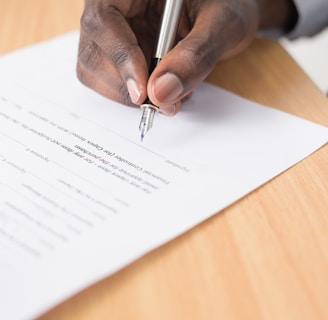Understanding Power of Attorney: Why It's Essential and How to Get One


Introduction
When it comes to planning for the future, many people focus on creating a will. However, there's another crucial document that often gets overlooked: a power of attorney (POA). In the UK, a POA is just as important, if not more so, than a will. This blog post will explain what a power of attorney is, why it's needed, how it compares to a will, how to get one, and the associated costs. We’ll also provide practical examples of when a POA might be necessary.
What is a Power of Attorney?
A power of attorney is a legal document that allows you (the 'donor') to appoint one or more people (known as 'attorneys') to help you make decisions or to make decisions on your behalf if you become unable to do so. This could be due to illness, injury, or simply because you are out of the country.
Types of Power of Attorney in the UK
1. Ordinary Power of Attorney (OPA):
- Temporary and only valid while you have mental capacity.
- Useful for short-term situations such as travelling abroad or recovering from an illness.
2. Lasting Power of Attorney (LPA):
- Comes in two forms: Health and Welfare, and Property and Financial Affairs.
- Remains in effect even if you lose mental capacity.
- Health and Welfare LPA allows decisions about medical treatment, care, and daily routine.
- Property and Financial Affairs LPA covers managing bank accounts, paying bills, and selling property.
Why is a Power of Attorney Needed?
A power of attorney is crucial for several reasons:
- Continuity of Care: If you become unable to make decisions, your appointed attorney can step in immediately, ensuring there are no gaps in managing your affairs.
- Avoiding Court: Without a POA, loved ones might need to go through a lengthy and expensive court process to gain control over their affairs.
- Peace of Mind: Knowing that someone you trust will manage your affairs if you're unable to do so provides significant peace of mind.
Why a Power of Attorney is More Important Than a Will
While a will outlines how your assets should be distributed after you die, a power of attorney ensures that your affairs are managed while you are still alive but unable to make decisions. Here's why it's more important:
- Immediate Impact: A POA is effective during your lifetime, covering scenarios where you might be incapacitated.
- Ongoing Management: It ensures that your financial and health matters are handled continuously without interruption.
- Broader Scope: A POA covers a wider range of decisions, including healthcare and day-to-day living, which a will does not address.
How to Get a Power of Attorney in the UK
Obtaining a power of attorney involves several steps:
1. Choose Your Attorney(s): Select one or more people you trust to make decisions on your behalf.
2. Complete the Forms:
- For an LPA, use the forms available on the UK government website.
- There are separate forms for Health and Welfare LPA and Property and Financial Affairs LPA.
3. Sign the Forms:
- You need to sign the forms in front of a witness.
- Your attorney(s) must also sign to confirm their acceptance.
4. Register the LPA:
- Submit the completed forms to the Office of the Public Guardian (OPG) for registration.
- This can take up to 10 weeks.
Costs Involved
- Registration Fee: As of 2024, the fee for registering each LPA is £82.
- Exemptions/Reductions: You may be eligible for a fee reduction or exemption if you’re on a low income or receive certain benefits.
- Legal Fees: If you choose to seek legal advice or have a solicitor help you with the forms, additional fees will apply.
When You Might Need a Power of Attorney
1. Elderly Parents: If an elderly parent develops dementia, a Health and Welfare LPA allows you to make care decisions, while a Property and Financial Affairs LPA enables you to manage their finances.
2. Travelling Abroad: If you're travelling abroad for an extended period, an OPA can allow someone to manage your property or finances temporarily.
3. Serious Accident: In the event of a serious accident leading to incapacitation, having an LPA ensures your healthcare and financial affairs are managed according to your wishes.
Final Point
A power of attorney is an essential document that ensures your affairs are managed if you become unable to make decisions. It's crucial for providing continuity, avoiding legal complications, and offering peace of mind. By understanding the types, benefits, and process of setting up a power of attorney, you can make informed decisions to protect yourself and your loved ones. Don't wait until it's too late; consider setting up a power of attorney alongside your will to ensure comprehensive future planning.
Stay happy and keep getting money wiser.

